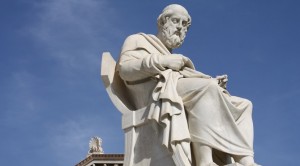The Arbitrary Inquisition of a Humanist Asylum Seeker
 The UK Home Office demanded a Pakistani asylum seeker explain the connection between Plato's contributon's to philosophy and humanism.
The UK Home Office demanded a Pakistani asylum seeker explain the connection between Plato's contributon's to philosophy and humanism. Earlier this month, the United Kingdom’s Home Office informed Hamza bin Walayat that his application for asylum was denied. Walayat, a native of Pakistan, has lived in the UK since 2011. Having rejected the traditional and religious customs of Islam (the official faith of Pakistan), Walayat identifies as a humanist and formally joined Humanists UK in August of last year, prior to his request for asylum. Walayat explained in his application that he had received death threats from family members because of his rejection of Islam.
Notably, Pakistan has strict and controversial blasphemy laws, including one that punishes any blasphemy of the Prophet Muhammad with death or imprisonment for life. Humanists are identified among the minorities facing persecution and oppression in Pakistan in a 2016 report by the British Pakistani Christian Association.
The Home Secretary, who ultimately rejected Walayat’s application for asylum, has received criticism from groups including the International Humanist and Ethical Union and Humanists UK. According to several reports, the application interview process required Walayat to identify humanist philosophers, symbols, and to use religious semantics in discussing humanism.
While the Home Office insists that each application for asylum is examined for its “individual merits,” it does seem that they questioned the sincerity of Walayat’s identification as a humanist. There are many people of faith who would be hard pressed to cite the ancient scholars of their religions, and yet they are accepted as genuine followers of their faiths with much less scrutiny. So why then is a humanist being evaluated on his knowledge of obscure academic details of his belief system when others are not?
The International Humanist and Ethical Union reported that Walayat was asked to identify humanist symbols. He could not name, for example, the Happy Human. But would all Christians be able to explain the meaning of the alpha and omega as Christian symbols? For that matter, would a humanist living deep in the rural South have had the opportunity to ever even see a happy human symbol?
Finally, the interviewing officer asked Walayat to discuss his understanding of the connection between Greek philosophy and humanism. Although Aristotle and Plato are often thought of as the fathers of philosophy and both placed great emphasis on intelligence and rational thought, suggesting that there is some kind of required connection between the philosophers and humanism, like religious dogma, is incorrect. The humanist organizations in the UK have rightly pointed out that there is no substantiated claim that Aristotle and Plato are even humanist philosophers. Although many debate the theistic views of these ancient thinkers, they both mention something like a higher creator in their writings. And humanists, of course, reject the notion of a higher power.
Philosophical semantics aside, how many self-identified humanists could meet the requirements the UK Home Office set for Walayat? Are Christians asked to cite the entire history of Christian belief or to name all of the apostles? If Walayat had been a “Smith” (and white), would the interviewer have asked the same questions? The examiner was clearly unfamiliar with humanism, but his interrogation raises many questions about the UK’s entire asylum process.
The UK Home Office demeaned a genuine asylum seeker because either they didn’t understand humanism, or they entertain specific prejudices against persons from certain nations or religions, or both. This debacle puts the UK’s credibility at risk and highlights the lack of appropriate procedural policies to prevent unfair scrutiny, and worse, uninformed scrutiny of a minority identification group. Humanism is a nonreligious belief system in the sense of an all-encompassing life stance, centered on the greater good of humanity. It is appalling that we have to be concerned about defending our sincerity of belief in a litmus test that’s supposed to protect us from being persecuted as nontheists.
